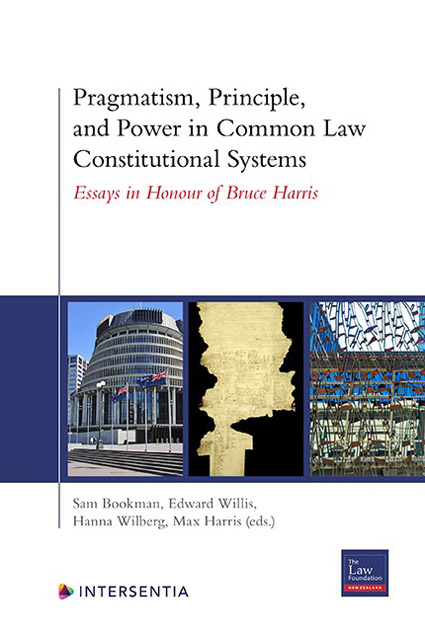 Pragmatism, Principle, and Power in Common Law Constitutional Systems
Pragmatism, Principle, and Power in Common Law Constitutional Systems Book contents
- Frontmatter
- Foreword
- Preface
- Contents
- The Writings of Professor Bruce Harris
- List of Cases
- List of Contributors
- Introduction
- Part I The Nature of Executive Power
- Part II Issues Concerning The Judiciary: The Nature of Judicial (and Executive) Power
- Part III Issues Concerning The Judiciary: Creativity and Pragmatism in Judicial Method
- Part IV Issues Concerning The Judiciary: Judicial Appointment and Accountability
- Part III The Nature of Unwritten Constitutions and Their Future
- Index
Constitutional Pragmatism and ‘Third Source’ Executive Authority
Published online by Cambridge University Press: 19 November 2022
- Frontmatter
- Foreword
- Preface
- Contents
- The Writings of Professor Bruce Harris
- List of Cases
- List of Contributors
- Introduction
- Part I The Nature of Executive Power
- Part II Issues Concerning The Judiciary: The Nature of Judicial (and Executive) Power
- Part III Issues Concerning The Judiciary: Creativity and Pragmatism in Judicial Method
- Part IV Issues Concerning The Judiciary: Judicial Appointment and Accountability
- Part III The Nature of Unwritten Constitutions and Their Future
- Index
Summary
INTRODUCTION
For at least 20 years the language of pragmatism has been used to describe New Zealand's constitution. Charlotte Macdonald argued in 2000 that our constitutional arrangements ‘have tended to favour the simple, accessible and pragmatic’. Dame Silvia Cartwright noted in her inaugural year as Governor-General that ‘constitutional change in New Zealand is often the result of a pragmatic and practical response to events’. The description of New Zealand's approach to constitutional development as one of ‘pragmatic evolution’ by the Constitutional Arrangements Committee of the House of Representatives appeared especially apt at the time – a convenient shorthand for both the lack of the kind of organising framework provided by a written constitution and a propensity to address constitutional matters on an as-needed basis. In hindsight, this official endorsement of the description marked a tipping point in our constitutional discourse. It is now almost second nature to invoke some concept of pragmatism when attempting to describe New Zealand's constitutional arrangements.
Nonetheless, I detect some dissatisfaction with the prominence pragmatism occupies in our constitutional thinking. Part of this dissatisfaction seems to stem from an understanding of pragmatism as a way of understanding our constitution independently of inquiries into its normative (and in particular, its moral) content. Rather than serve as a theory of constitutional practice, pragmatism stands as an empty justification – or perhaps an apology – for a lack of coherent constitutional theory. and our comfort with relying on such empty vessels has been seriously shaken. We must acknowledge a comparative context where naked populism and ad hoc political manoeuvring has struck at the foundations of democratic constitutionalism. The institutions of constitutional government can fail where underlying normative considerations are ignored, challenged or perceived as inadequate. One of the lessons of this international experience may be that coherent constitutional theory buttresses wide acceptance for the moral norms that support institutional resilience and strength. Over-reliance on pragmatism at the expense of this type of normative grounding can appear quaint given the state of the world, and perhaps even increasingly naive.
However, I would argue that anti-normativism is not the only frame of reference for understanding pragmatic accounts of our constitution. It is also possible to place our constitutional practice within a rich philosophical tradition that understands pragmatism as a particular branch of knowledge, withits own intellectual goals and methods. This approach retains a strong focus on instrumental efficacy, but it does not imply a rejection of constitutional theory.
- Type
- Chapter
- Information
- Pragmatism, Principle, and Power in Common Law Constitutional SystemsEssays in Honour of Bruce Harris, pp. 29 - 56Publisher: IntersentiaPrint publication year: 2022
